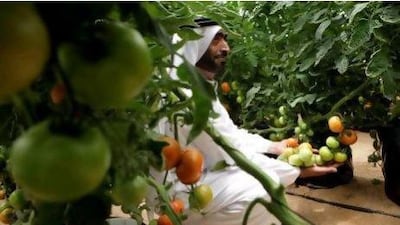AL THARWANIYA // Farmers in Al Gharbia who have slowly been converting to hydroponics - which allows them to grow fruit and vegetables using less water and energy - are now being offered loans to help them make the switch.
Yafour Al Hameli, a farm owner in Al Tharwaniya, is in the process of converting. "I've had this farm since 1997," he said. "Using hydroponics will help me grow more food with less water
For the past year and a half, Mr Al Hameli has been growing almost 30 tonnes of tomatoes and peppers a year in soil in his six greenhouses. When his new hydroponics facility is complete in three weeks, it will allow him to dispense with soil and the problems associated with it.
"This technology uses 80 per cent less water, less pesticides and less fertiliser than traditional farming," said Yousri Kabil, an engineer at the protected agriculture unit of the Farmers Services Centre, an Abu Dhabi government body that aims to modernise the emirate's farms. "It's better because it's a more controlled system."
And this modernisation is what Mr Al Hameli and a few other farmers have started, with the centre's help.
The system, imported from Holland, grows plants without soil. They are fertilised with mineral nutrient solutions and the irrigation water is recycled using sand, screen filters and ultraviolet rays.
"I will use that water to irrigate my open field of cherry tomatoes," said Mr Al Hameli.
It should dramatically increase his yield, adding an extra tonne a year of cucumbers to his current three, and an extra two kilos of tomatoes and peppers from each of his 3,600 plants - a 25 per cent increase. In total, he should get an extra seven tonnes of vegetables a year.
But the system can be complicated to understand for farmers used to traditional methods. "It's not easy because it takes time to understand the system and train my eight workers," said Mr Al Hameli. "But I want to avoid soil problems like nematodes and high salinity, so this will definitely help."
It is also costly - converting even a small, 10-greenhouse farm costs about Dh250,000. Mr Al Hameli shouldered this cost himself, but for others there is now help in the form of loans from the Khalifa Fund, a government organisation that helps develop Abu Dhabi businesses.
It provides a loan for half the cost of conversion, which farmers do not have to start paying back until they start selling their produce.
But take-up has been slow so far. "It can take six months to a year to get approved and, so far, about three or four farmers have done this," said Dr Robert Caudwell, the centre's technical development manager.
But he is hopeful that it will pick up. "Farmers are keen on it and we want to encourage hydroponics on all Abu Dhabi farms, to be able to produce food all year round."
A larger farm with 30 greenhouses in the western region's Umm Al Hosn area has already been converted and its first the seedlings will be planted next month.
"So far, we have tomatoes, squash and cucumbers and we plan to expand it to melons, green beans, iceberg lettuce, strawberries and aubergines," said Mr Kabil. "At each harvest, every five to nine months on average, we will change the crop."
When Mr Al Hameli's first hydroponics crops are harvested, they will be sold across the UAE. "I will also introduce different varieties later on," he said.
The centre plans to install the system in farms in Abu Dhabi and Al Ain before the end of the year to produce leafy vegetables and forage crops. "We don't have a lot of water in our area, so to save it, we have to change our ways," added Mr Al Hameli.

